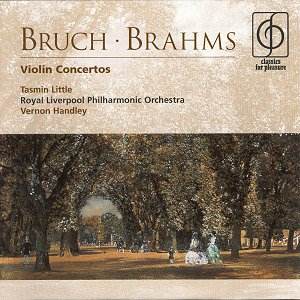When programming concerts as a conductor, I try, as
Bruch’s biographer, to avoid juxtaposing his music with the greater
Brahms, an adjective which Bruch himself used in 1907, ten years after
Brahms’ death. "In 50 years time I shall be remembered only for
my G minor violin concerto…Brahms was the greater composer because he
took risks". But if the two are to be bedfellows, then at least
on this CD we have Bruch represented by his best music in the first
violin concerto, (there are two others) as the companion work. It achieved
its final form in 1868, Mendelssohn’s concerto having dominated the
concert platform for 25 years. The violinist Joseph Joachim was an interesting
performing link from Mendelssohn, via Bruch, to Brahms. He played the
first work as a very young man, advised Bruch on the final revisions
for his, and was asked for advice by Brahms, contributing the first
movement cadenza which is usually played, including by Tasmin Little
here. There are also similarities such as the finale paying lip-service
to Hungarian gypsy music with lashings of goulash amongst the pyrotechnics.
Bruch combines drama with lyricism in the first movement, Brahms (his
first movement lasts nearly as long as the whole Bruch) sticks with
the drama, and both have wonderfully tuneful slow movements (therein
lies Bruch’s magic, for he knows how to produce a melody). Even Brahms,
not the most modest of men, must have been touched by Bruch’s Adagio
when he came to write his own fine slow movement ten years later.
I have known Tasmin Little’s playing for nearly 20
years, indeed I conducted her first Brahms concerto when she competed
for, and won, the Gold Medal competition (in the footsteps of Jacqueline
du Pré) at the Guildhall School of Music in London, where she
studied. Subsequently she has played much of the standard repertoire
with my Lambeth Orchestra, including Bruch No.2 and his Scottish
Fantasy (which she went on to record magnificently). Her playing
is as magical and alluring as it was then, full of personality, warmth
and humanity, and these two recordings date from fairly early on in
her career. Her tone is sweet, with considerable vibrato, the start
of the Adagio of the Bruch compellingly still and tonally rich.
Her phrasing connects musically, drawing the ear as the music unfolds
with unerring attention to shape and pace. It’s good to see Jonathan
Small’s fine oboe playing in the Adagio of Brahms’ concerto receiving
due mention in the credits for it is thoroughly deserved (and so is
the orchestra’s unnamed principal horn for his playing at various points).
Vernon Handley and the RLPO are attentive accompanists, the future Mr
Tasmin Little (Mike Hatch of Floating Earth) the expert balance engineer
thus keeping it all nicely in the family. This is a fine disc, occupying
a worthy place among the top ten recordings of both works.
Christopher Fifield

![]() Tasmin Little (violin)
Tasmin Little (violin)
![]() EMI
CLASSICS FOR PLEASURE 7243 5 74941 2 0 [64.32] bargain price
EMI
CLASSICS FOR PLEASURE 7243 5 74941 2 0 [64.32] bargain price